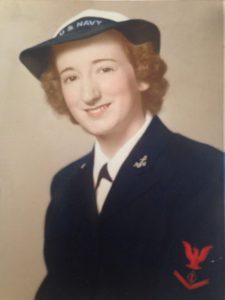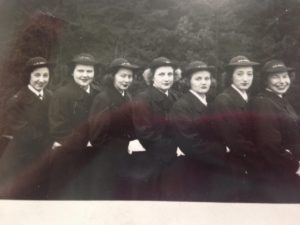
Winona Shingler, 1943
Women Accepted for Volunteer Emergency Services (WAVES) was created when President Franklin D. Roosevelt signed the Navy Women’s Reserve Act into law in July 1942.
A woman serving in the military is familiar to us now. But in the 1940s it was not.
When I asked my Aunt Winona why she joined the WAVES in 1943 at the age of 20, she answered that she felt it was the patriotic thing to do. Her brothers were all married with young families, so she wanted to be the family member to serve her country.
My grandparents at first refused to sign the permission papers. But then my Uncle Orbin (who had served in WW1), convinced them to sign since he knew Winona would enlist as soon as her 21st birthday rolled around.
She spent eight weeks in WAVES training in New York City. Aptitude testing showed a strong capacity for key punching, so she spent another six weeks at IBM Headquarters in NY for additional training in that area.
After training, Winona (nicknamed Winnie) and the other WAVES in her class took a three-day train trip to Bremerton, Washington, where they were stationed.

Winona was responsible for the secret coding of wiring boards for key punching. Imagine this: As a Specialist I, she knew where every ship in the Pacific Ocean was located! She kept track of supplies on the battleships and aircraft carriers.
There were other secret assignments, once working with an attorney and IBM experts flown into Bremerton. But some things shall remain untold!
All WAVES served stateside. Sometimes other women were upset with the WAVES since when women stepped in to assume stateside sailors’ duties, the men then were available to ship out.
One of the highlights during her service was the arrival of FDR. He arrived by ship and the military personnel were unaware of his infirmity caused by polio. He spoke standing behind (and holding onto) a podium. He pulled it off because of the overwhelming strength of his personality. (Although hiding behind or holding on to a podium is something I warn against in public speaking!)
My aunt says she loved everything about serving her country.
It blows me away to think about my young aunt from a sleepy little town in rural Pennsylvania joining the Navy, serving, learning, and doing all of that interesting STUFF during World War II.
Certainly it took courage to take that first step and then perseverance to remain enlisted after the war ended.
I come from good stock!
Thank you, Aunt Winona, for your service to our country and for the “can do” positive attitude you always present. You are loved more than you will ever know.




Thought you would like to know my Aunt Pat also served in the WAVES, just a little later than your Aunt Winona.
It would be interesting to know if they served together or even knew each other. Email me separately with her full name and any service details you know. Thanks!
What a remarkable woman!
Just like you!
Thank you, dear friend.
She reminds of you. Very pretty young lady. You did come from good stock just like my dear friend and your sweet sister Beverly.
Thank you so much. And it was wonderful to spend time with my sisters, cousins, and daughter. Family time is too short!
Aunt Pat’s maiden name was Patricia Jean Brauer. When she married Uncle Dick, also in the Navy, her last name changed to Burke. If it helps, her birth date was July 10, 1935. Because of the obvious age difference, I doubt they would have served together unless Aunt Winona stayed in the WAVES for an extended time period. You might find it interesting that her second daughter, Arlie Jean Burke, was named for Admiral Arleigh Burke.
I’ve printed this out to include in my next note to her. Thanks!
Aunt Winona is an amazing lady. A good role model for all of us!
Hi Beth – thanks for commenting for the first time! It was wonderful to spend quality time with Winona and Lynne & Ake.
Laura and I, along with Enid and my two sisters, went up on Saturday through Monday morning. It was hard to say goodbye.